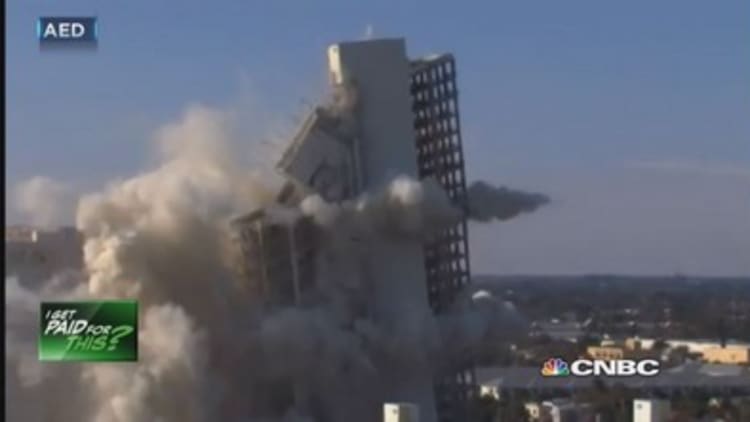
Eric and Lisa Kelly have an explosive relationship. They run a company called Advanced Explosives Demolition, a family business that gets paid to blow up buildings.
"I saw my dad blow a smokestack when I was fourteen and I said, 'that's what I want to do,'" Eric Kelly said in an interview with CNBC's "Power Lunch."
"I didn't know," Lisa Kelly said laughing. "I had no clue I would be here. It definitely was not my chosen field; however, we've made it work really well."
They've made it work for 36 years, traveling across the country and around the world with kids in tow to sites in need of leveling.
According to the Kellys, bringing down a building isn't the hardest part.
"Being able to get past all the city officials, getting all the permits and getting all the insurance in place, all the behind the scenes stuff. In order for the building to actually hit the ground, it is an absolutely mandatory thing that we have to do," said Lisa.
Read More The "other" Russell Wilson
Determining what kind of structure they're dealing with is equally important.
"You have to figure out what the building comprises of. Wood, steel, reinforced concrete, steel with reinforced concrete, and you have to analyze how much of an area you have to remove from that building to bring it past its center to get it to break apart and fall in a specific area," Eric said.
The Kellys faced a particularly challenging project in 2010: a 31 story building in West Palm Beach, Florida that had been damaged by hurricanes.
"It was very high. We had buildings that were so close … and the water channel right there," said Lisa.
"We determined that we were going to shoot it on six floor and that would have allowed it to fall in a particular area. There was about fourteen hundred pounds of explosives total … we drilled a little bit over three thousand holes," Eric added.
After the structural preparations are completed, Eric's team moves on to protective measures to ensure that flying materials don't hit other buildings.
"The explosives detonate at about 15,000/17,000 feet per second; that can launch a rock pretty fast," Eric noted.
When asked about the best part of the job, Lisa said seeing the building come down is great but hearing Eric's voice on the radio afterward is the best.
"I wait and I wait and I hear that 'all clear,' then I know he's ok, our guys are ok, I know everybody in that surrounding area is ok and I know from there that our clients are going to be very happy," she said.


